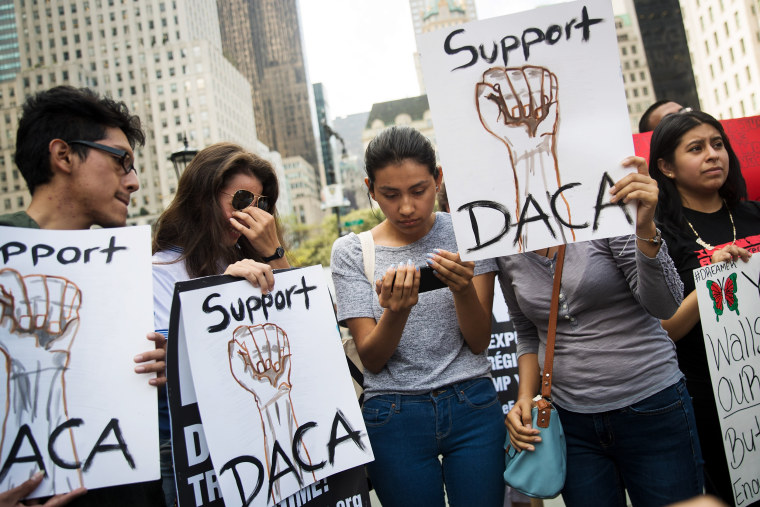Ending weeks of speculation, Attorney General Jeff Sessions announced Tuesday that the Trump administration isrescinding the Deferred Action for Childhood Arrivals (DACA) program. While leaving a six-month window for Congress to work on a permanent solution to the plight of the Dreamers, as DACA grantees are known, President Donald Trump otherwise intends to wind down the program instituted by Barack Obama five years ago.
For the Dreamers, much remains unknown about their future in this country. The president himself seemed to add to such uncertainty with by tweeting Tuesday night, “Congress now has 6 months to legalize DACA (something the Obama Administration was unable to do). If they can't, I will revisit this issue!”
Trump left it to his attorney general to explain to the nation why DACA is potentially ending. However, Sessions’ statement offered a rationale for rescinding the program that contained several questionable assertions.
Related: What Now? Here's What DACA Recipients Should Know
Here are six fact-checks on Sessions’ statement on the suspension of DACA:
Sessions: DACA was an “unconstitutional exercise of authority by the executive branch.”
Fact-check: This statement seems to be Sessions’ opinion. The final arbiter of constitutionality is the U.S. Supreme Court, which has never ruled on DACA. Two legal challenges brought against the program, in the D.C. Circuit and in the Fifth Circuit, were both tossed out for lack of standing. Although the Supreme Court deadlocked on the challenge to the Deferred Action for Parents of Americans (in 2016), that case involved a different program and set no legal precedent. In addition, presidents have been taking executive action on immigration at least as far back as Eisenhower.
Sessions: “The DACA program was implemented in 2012 and essentially provided a legal status for recipients for a renewable two-year term, work authorization and other benefits.”
Fact-check: DACA provides its recipients with temporary relief from deportation. As the Citizenship and Immigration Services website notes, “Deferred action does not confer lawful status upon an individual.” Though DACA recipients are considered “lawfully present,” that is not the same as legal status and exists only for the term of their grant. The permission to work that grantees receive does not come from DACA; that comes from statutory law allowing deferred action recipients to work.
DACA grantees are ineligible for most social services like welfare and Medicaid. But immigrant youth with DACA can obtain driver’s licenses. In some states, DACA grantees qualify for in-state college tuition rates; these decisions were made by state legislators and state university systems. Similarly, certain states offer low-income DACA grantees to access health care regardless of immigration status.

Sessions: DACA is “unilateral executive amnesty.”
Fact-Check: Immigration amnesty is a blanket pardon to all the members of a defined class, such as the kind Ronald Reagan introduced in 1986. DACA recipients, in contrast, have to apply and be approved individually for their deferred action. They pay $495 in application and biometrics fees. Their relief is temporary, and does not provide grantees – with rare exceptions - with a pathway to legal status or citizenship. Nor does DACA provide any forgiveness for grantees' unlawful presence.
Related: Tears, Anger and a Promise to Fight Back as Trump Ends DACA
Sessions: DACA “contributed to a surge of unaccompanied minors on the southern border.”
Fact-Check: The influx of unaccompanied minors from Central America actually began in 2008, four years before Obama announced DACA. While these young people could seek asylum or Special Immigrant Juvenile status, they are ineligible for DACA, because the program requires continuous residency in the U.S. since 2007. Moreover, there is little evidence establishing DACA as a “pull” factor in drawing unaccompanied minors northward. But there is much research and reporting on the “push” factors, like deadly gangs and violence, that have driven these young people to flee their homelands.
Sessions: DACA “denied jobs to hundreds of thousands of Americans by allowing those jobs to go to illegal aliens.”
Fact-check: The Attorney General did not provide data to support this statement, which could fall into the realm of viewpoint rather than fact. Many immigrant, Latino, and business advocacy groups consider the idea of immigrants, in general, as “job-stealers” to be a myth. There is ample evidence from liberal, conservative, and non-partisan groups that DACA grantees provide an overall net benefit to the economy.

Sessions: “To have a lawful system of immigration that serves the national interest, we cannot admit everyone who would like to come here. That is an open border policy and the American people have rightly rejected it.”
Fact-Check: It is unclear how this statement relates to DACA per se, as DACA grantees by definition are not seeking to come here. They are here. A recent survey by Tom Wong of the University of California San Diego of DACA grantees found that the average age that respondents said they’d arrived in the US was 6-and-a-half years old. And a brand-new Politico poll shows that voters (including a majority of Republicans) overwhelmingly support allowing the Dreamers to remain in this country.

